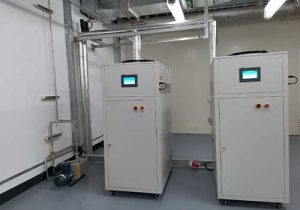small thermal chamber
Small Thermal Chamber: A Comprehensive Guide
Introduction
A small thermal chamber is an essential tool in various industries and scientific fields, designed to create a controlled environment for testing and storage under specific temperature conditions. These compact chambers are particularly useful for applications requiring precise temperature control in a limited space. This article explores the design, working principles, types, and applications of small thermal chambers, providing a detailed understanding of their role in modern technology and industry.

Design and Working Principles
Small thermal chambers are constructed with materials that provide excellent thermal insulation to maintain a stable internal environment. The key components and principles include:
Insulation Materials:
Common insulation materials include polyurethane foam, fiberglass, and polystyrene. These materials are chosen for their low thermal conductivity and ability to maintain consistent internal temperatures.
Wall Construction:
The walls of a small thermal chamber typically consist of multiple layers, including an inner lining, insulation layer, and outer shell. This multi-layer construction enhances thermal resistance and structural integrity.
Temperature Control Mechanisms:
Small thermal chambers are equipped with heating and cooling systems to maintain the desired internal temperature. These systems can include electric heaters, Peltier elements, or refrigeration units.
Sealing and Airflow Management:
Proper sealing and airflow management are crucial to prevent heat exchange and maintain uniform conditions within the chamber. This includes the use of gaskets, seals, and fans to ensure consistent temperature levels.
Types of Small Thermal Chambers
Benchtop Thermal Chambers:
These compact chambers are designed to fit on laboratory benches, making them ideal for small-scale testing and research applications.

Portable Thermal Chambers:
Portable chambers are lightweight and easy to transport, suitable for fieldwork and on-site testing.
Stability Testing Chambers:
Used primarily in the pharmaceutical industry, these chambers provide controlled conditions for stability testing of drugs and biologics.
Environmental Testing Chambers:
These chambers simulate various environmental conditions, such as temperature and humidity, for testing the durability and performance of products.
Applications of Small Thermal Chambers
Electronics Testing:
Small thermal chambers are used to test the performance and reliability of electronic components and devices under extreme temperature conditions.
Pharmaceuticals:
In the pharmaceutical industry, these chambers are used for stability testing of drugs, vaccines, and biologics to ensure their efficacy and safety.
Materials Science:
Researchers use small thermal chambers to study the thermal properties and behavior of materials under different temperature conditions.
Quality Control:
Manufacturers use these chambers to perform quality control tests on products, ensuring they can withstand specified temperature ranges.
Benefits of Small Thermal Chambers
Precise Temperature Control:

Small thermal chambers offer accurate temperature control, ensuring consistent and reliable results.
Compact Design:
Their small size makes them ideal for laboratories and facilities with limited space.
Energy Efficiency:
The use of high-quality insulation materials and efficient temperature control systems reduces energy consumption and operational costs.
Versatility:
Small thermal chambers can be customized to meet the specific needs of different applications, providing flexibility and adaptability.
Maintenance Tips
Regular Inspection:
Periodically inspect the chamber for signs of wear, damage, or degradation of insulation materials.
Cleaning:
Clean the interior and exterior surfaces regularly to prevent contamination and maintain efficient operation.
Calibration:
Calibrate temperature control systems regularly to ensure accurate and consistent performance.
Seal and Gasket Maintenance:
Check and replace seals and gaskets as needed to maintain proper sealing and prevent heat exchange.
Safety Considerations
Temperature Monitoring:
Continuously monitor the internal temperature to prevent overheating or excessive cooling, which can damage samples or equipment.
Proper Ventilation:
Ensure adequate ventilation to prevent the buildup of heat, especially when working with volatile substances.
Use of Protective Equipment:
Wear appropriate protective equipment, such as gloves and goggles, when handling samples or materials inside the chamber.
Factors to Consider When Selecting a Small Thermal Chamber
Temperature Range:
Choose a chamber with a temperature range that meets your specific needs, whether for high-temperature testing or low-temperature storage.
Size and Capacity:
Select a chamber with an appropriate size and capacity for your samples or products, ensuring it can handle the required volume.
Control Mechanisms:
Look for chambers with precise control mechanisms, such as digital controllers or programmable settings, for accurate temperature regulation.
Energy Efficiency:
Consider the energy efficiency of the chamber to reduce operational costs and environmental impact.
Conclusion
Small thermal chambers are indispensable tools in various industries and scientific fields, providing precise control of temperature conditions for a wide range of applications. By understanding their design, working principles, and benefits, users can optimize the performance and longevity of these chambers for their specific needs. Whether in electronics testing, pharmaceuticals, materials science, or quality control, small thermal chambers offer reliable and efficient solutions for maintaining stable internal environments. Regular maintenance, safety considerations, and careful selection ensure optimal performance, making small thermal chambers a valuable investment for any application requiring precise temperature control.
Related recommendations
free cooling unit
418Introduction to Free Cooling Units Free cooling units (FCUs) represent a significant advancement in the field of temperature management, particularly in data centers and industrial settings. By...
View detailsModel Considerations for Different Chiller Manufacturers
1475Model Considerations for Different Chiller Manufacturers At present, there are more and more manufacturers producing chillers, and there are many refrigeration equipment that need to be selec...
View detailsriedel chillers
444Introduction Riedel is a well - established brand in the field of chiller manufacturing. With a long - standing reputation, Riedel chillers are known for their reliability, efficiency, and adv...
View detailsHow to Maintain the Low Temperature Refrigeration System Chiller?
1248How to Maintain the Low Temperature Refrigeration System Chiller? When installing the chiller, it is necessary to ensure that the power socket is in good contact and is reliably grounded.It...
View details
 LNEYA Chiller
LNEYA Chiller






HelloPlease log in